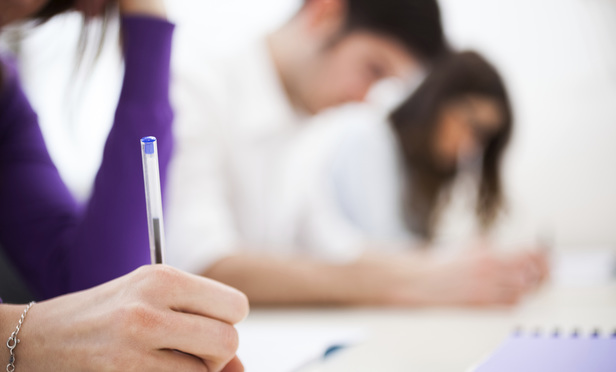Would-be California lawyers flock to take July bar exam.
Over the last year California’s bar exam has been scrutinized and vilified. But that hasn’t stopped a crush of would-be Golden State lawyers from registering for the latest crucible, which starts Tuesday.
Applications to take the July bar exam topped 10,000 this year—an increase of more than 1,000 above July 2016′s numbers, according to figures released by the state bar. Requests to take the general bar exam are up by 499 to 7,981. The number of out-of-state lawyers who applied to take next week’s test surged to 2,051, up from 1,549 this time last year.
The application rush may be due to the fact that this year’s exam is the first to be held over two days instead of the traditional three.
“We’re very excited about that, and I think maybe attorneys from the other jurisdictions are too, which is why they’re all coming,” Gayle Murphy, the bar’s senior executive for admissions, told a bar committee hearing on July 13.
The bar has reported a year-over-year jump in the number of “immediate repeaters,” or those who failed the February exam, from 2,387 to 2,485. The pass rate for that test slid to a dismal 34.5 percent, renewing calls for bar examiners and the state Supreme Court to consider lowering the passing score.
Susan Smith Bakhshian, director of bar programs for Loyola Law School, called the uptick in bar-takers “surprising and predictable at the same time.”
“The bar passage rates for the last several exams have been historic lows, so of course, more people are retaking the exam,” Bakhshian said. “The surprise, at least somewhat, is that more out-of-state attorneys decided to take the exam.”
Bakhshian said she doesn’t expect those attorneys to pass the test at any higher rates because California’s required passing, or “cut,” score remains very high. She added: “The essay portion of the exam requires specific knowledge of California law, including specific community property, evidence and civil procedure, some of which are quite unique to our jurisdiction.”
Murphy said organizers had granted close to 600 accommodations to test applicants who, because of disabilities, require extra time, private rooms, assistants or dictation services. That, in turn, led bar officials to book another testing center for applicants needing accommodations. “We are really stuffed to the gills,” Murphy said.
Not every applicant will actually sit for the test. As of Tuesday, exam administrators had deemed 29 registrants ineligible—for failing to meet certain legal education requirements—to take the test. Another 194 had withdrawn their applications. Still, a potential 9,837 exam-takers would mark the highest turnout in more than a decade.
The increase in California bar exam applicants coincides with a recent 20 percent bump in the numbers of people taking the Law School Admissions Test. Some law school professors and deans have attributed the increase to a heightened awareness of legal issues tied to Trump administration policies, such as immigration restrictions.
California’s legal education community—and the state Supreme Court—will be watching to see if the move to a two-day exam improves scores. The court is also waiting for bar leaders to complete validity tests of the exam before considering pleas by lawmakers and law school deans to lower the test’s second-highest-in-the-nation passing score.





